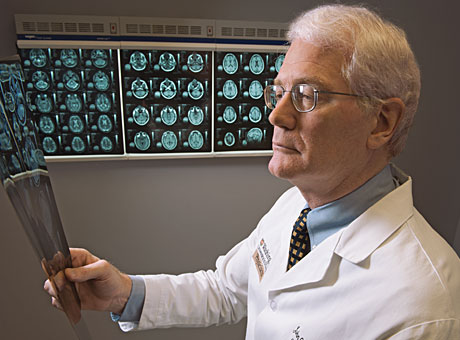
John Morris, MD, and others at the Charles F. Knight Alzheimer’s Disease Research Center, are looking at treatment methods that may help prevent the disease. He and Randall Bateman, MD, have enlisted volunteers worldwide to participate in a trial.

John Morris, MD, and others at the Charles F. Knight Alzheimer’s Disease Research Center, are looking at treatment methods that may help prevent the disease. He and Randall Bateman, MD, have enlisted volunteers worldwide to participate in a trial.
Up until now drug trials to treat Alzheimer’s disease after dementia onset have been ineffective; such discouraging results are not new to the long-fought Alzheimer’s disease field. However, at Washington University School of Medicine, a recently launched drug trial — in those who do not yet have outward symptoms — may offer the possibility of success.
Ten years ago, Olga Mohan, a California pediatrician in the prime of her career, found difficulty expressing her thoughts in words and was diagnosed with Alzheimer’s in her early 50s. “It is a horrible disease,” said her husband, Fred Simmons. “We want others who experience it through their family
to have the best chance to avoid it.”
In learning about John C. Morris, MD, and his leading-edge Alzheimer’s research, the couple decided to make a gift. Morris, the Harvey A. and Dorismae Hacker Friedman Distinguished Professor in Neurology, directs the university’s Charles F. Knight Alzheimer’s Disease Research Center.
“I believe John Morris is of the highest integrity and intelligence,” Simmons said. “I learned exactly what John was doing, research-wise, and realized that it could have far-reaching implications.”

Olga Mohan, MD, and Fred Simmons
Through generous support provided by Olga Mohan, Fred Simmons and many others, new approaches are being pioneered at Washington University. Morris and colleague Randall J. Bateman, MD, the Charles F. and Joanne Knight Distinguished Professor of Neurology, have enlisted volunteers worldwide who have a rare, inherited form of Alzheimer’s disease that strikes much earlier in life.
As a result, the new study, called the Dominantly Inherited Alzheimer’s Network Trials Unit (DIAN-TU), is focused on testing drugs that may provide a therapeutic benefit at the disease’s earliest stages before symptoms begin. Prevention, the research suggests, has a better chance of succeeding than treatment after cognitive impairment.
“If the study demonstrates efficacy, it will provide much needed hope that one day truly effective therapies for Alzheimer’s will be available,”
Morris said.